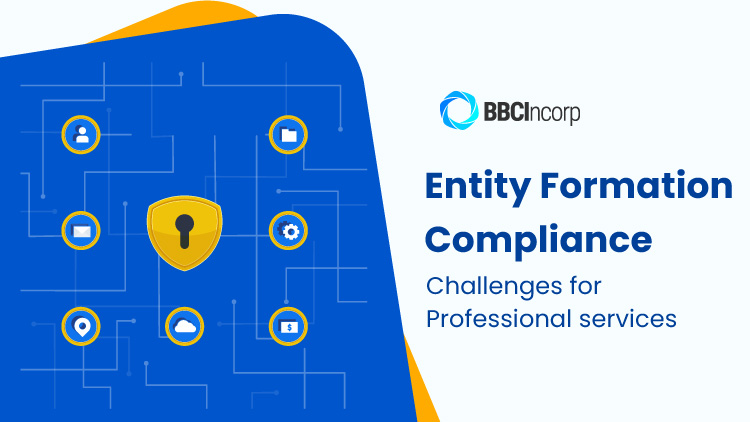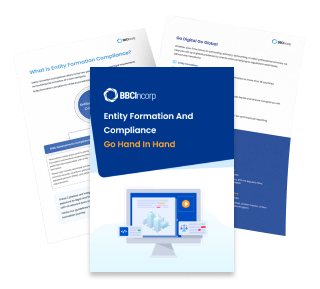
Forming a new entity entails much more than simply filling out forms and paying registration fees; there are numerous compliance requirements and obligations to meet.
With globalization on the rise and clients increasingly expanding outside their borders, the compliance task of professional firms has changed and along with these changes, there are now more challenges than before.
In this article, we’ll look at how professional service firms handle client compliance issues related to entity formation.
Why do professional services face compliance issues related to entity formation?
Clients increasingly rely on professional services for entity formation, whether for advice or consultation on the whole process. If you’re an attorney, CPA, or business consultant, you’re likely to be approached by clients seeking your expertise in this area.
For professional services, helping clients to stay on top of all applicable laws and regulations is crucial, because it creates a solid foundation for business expansion success.
Yet, a new study by Deltek has pointed out many professional firms are struggling to understand the regulatory environment in jurisdictions where client plans to operate. According to this study, legislative change is one of the top 5 issues professional firms feel unprepared for. In addition, 79% of professional firms do not think their business is prepared for regulatory risk, this includes understanding the potential liability exposure when helping clients form entities.
Entity formation becomes more complex
While clients’ global reach is rapidly expanding, reaching unfamiliar regions such as the Southeast or Midwest, firms are hitting roadblocks simply because they lack sufficient experience in entity formation in these countries.
Helping clients achieve the gold standard required for honest operations has become more challenging because entity formation involves an array of global compliance standards, such as:
- Know Your Client (KYC);
- Anti Money Laundering and Counter-Terrorist Financing (AML/CTF);
- Foreign Account Tax Compliance Act (FATCA);
- General Data Protection Regulation (GDPR); and so on
Not to mention the deadlines, requirements, and practices for compliance vary by country, typical professional firms serve between 10 and 15 variations of compliance requirements for clients’ entity formation, including but not limited to the following:
- UBO registers;
- Economic Substance;
- Tax Compliance;
- Financial Reporting Requirements;
- Business Licenses & Permits; and more
Moreover, many events and changes can trigger new compliance actions for clients, including changes in company structure or ownership, new regulations or guidelines from governing bodies, or merger and acquisition activity. This requires professional firms to have a deep understanding of each client’s business, as well as their specific compliance risks and needs.
Lack of expertise to perform due diligence
In order for professional services to fulfill their fiduciary responsibility and mitigate risks associated with entity formation, a certain level of due diligence needs to be done upfront. For instance, verifying client backgrounds, reviewing financial situations, conducting risk and compliance checks, as well as investigating business activities.
As professional firms take on more clients from around the world, they also need to deal with increased due diligence requests; yet, firms don’t have enough in-house expertise and resources to perform these tasks. This is because firms rely heavily on old methods for conducting due diligence, which was not designed to keep pace with the constant changes in regulations and client needs.
Professional firms need to chase down paper trails and contact networks in different countries to get relevant information, which can be time-consuming, and the results are not always accurate.
What happens if firms fail to manage clients’ compliance issues?
If professional firms do not have the proper systems and controls in place to manage their clients’ compliance risks, they may face a number of consequences:
- Fines and Penalties
Professional firms handle clients’ entity formation on their behalf, so if there are any compliance lapses, the firm will be held liable and may face heavy fines and penalties.
Let’s say a firm fails to advise clients on getting the right business licenses for their new company, the client may be fined for operating without a license and the professional firm may also be held liable for not performing due diligence properly.
- Reputational risk
Another consequence of failing to manage clients’ compliance risks is reputational damage. If a professional firm is caught up in a scandal or investigation, it will not only affect the firm’s reputation, but also the client’s. This can lead to loss of business and damage relationships beyond repair.
The way forward
Managing challenges associated with clients’ entity formation compliance can be daunting for professional service firms, but there are a few things firms can do to ease the burden:
- Review current practices and processes
Firms need to review the current business practices and processes for entity formation and management to identify any gaps and areas for improvement.
For instance, professional firms should consider global compliance trends such as automating manual processes to improve efficiency and accuracy, as well as putting in place robust systems and controls to manage compliance requirements.
- Conduct a risk assessment
Firms should conduct a thorough assessment to identify which areas of the clients are most exposed to compliance risks. This will help professional firms focus efforts on the areas that need the most attention.
Professional firms will need to adopt a more holistic and proactive approach to managing their clients’ compliance risks. This means having a clear understanding of the global regulatory landscape and being up-to-date with any changes or updates. Firms should also put in place policies and procedures that reflect the latest compliance requirements.
- Use a partner for entity formation compliance
Perhaps one of the best ways firms can manage clients’ compliance risks is to partner with a specialist entity formation company. These companies have the expertise and resources to handle all aspects of entity formation compliance, from due diligence to risk management. This will take the burden off professional firms and allow them to focus on their core competencies.
Quick guide
Entity Formation Compliance
Understand global compliance issues to ensure risk-free entity formation journey for clients.


Ensure clients’ entity formation compliance with BBCIncorp
We simplify entity formation in more than 18 countries, so you don’t have to spend hours navigating government websites to register a company for your clients.
- Get notified of critical filings and due dates
Handling multiple clients’ projects is no longer a problem because you’ll get notifications about upcoming obligations in multiple countries where your client conduct business. This helps ensure you plan ahead and avoid penalties for late filings.
- Monitor compliance for multiple clients
Our cloud-based portal allows you to monitor and complete compliance filing requirements for all of your clients from a single screen.
- Keep track of compliance filings status
Get real-time updates on the status of your clients’ filings without having to chase down multiple people for information.
When you entrust us with your clients’ compliance, you’ll be sure to have the peace of mind that it will be done accurately and on time. Feel free to drop us a message via service@bbcincorp.com so we can discuss more your specific case.
Disclaimer: While BBCIncorp strives to make the information on this website as timely and accurate as possible, the information itself is for reference purposes only. You should not substitute the information provided in this article for competent legal advice. Feel free to contact BBCIncorp’s customer services for advice on your specific cases.
Get helpful tips and info from our newsletter!
Stay in the know and be empowered with our strategic how-tos, resources, and guidelines.


